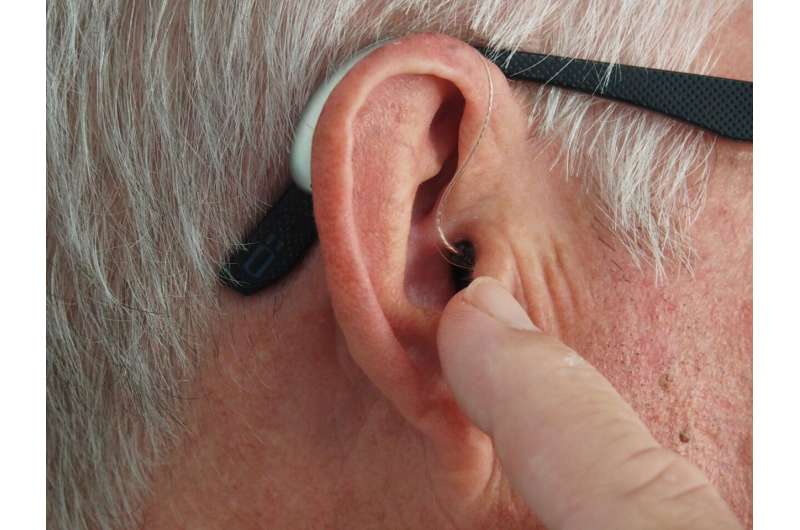This article has been reviewed according to Science X's editorial process and policies. Editors have highlighted the following attributes while ensuring the content's credibility:
fact-checked
reputable news agency
proofread
For older adults at risk of cognitive decline, hearing aids may reduce risk by half

Using hearing aids can slow cognitive decline in older adults with hearing loss who are also at risk for memory and thinking problems, according to recent research.
A large clinical trial found that for older adults at risk of cognitive issues, using hearing aids for three years cut their rates of cognitive decline in half.
While previous research has shown that hearing loss is a risk for developing dementia, the Aging and Cognitive Health Evaluation in Elders (ACHIEVE) study was the first randomized, controlled clinical trial to assess the effect of intervening with hearing aids. Results from the study were reported at the Alzheimer's Association International Conference and simultaneously published in The Lancet.
David Knopman, M.D., a Mayo Clinic neurologist and study co-investigator, says the study shows positive benefits in delaying cognitive decline for people roughly age 75 and older with hearing loss.
"Older individuals who are at risk for cognitive decline but who are still (cognitively) normal, who can still operate the hearing aids, who won't lose the hearing aids, are likely to achieve some benefit," Dr. Knopman says.
Study: Hearing aids slowed cognitive decline by 48%
The ACHIEVE study, conducted at four U.S. sites, is a randomized trial of older adults aged 70 to 84 with untreated hearing loss who were free from substantial cognitive impairment. Nearly 1,000 participants were recruited from two study populations: 238 adults participating in the Atherosclerosis Risk in Communities (ARIC) study, and 739 healthy community volunteers. At the start of the trial, all study participants had mild to moderate hearing loss typical of older adults but no substantial cognitive impairment.
The three-year intervention included the use of hearing aids, a hearing "toolkit" to assist with self-management and ongoing instruction and counseling with an audiologist.
In the total study group, hearing aids did not reduce cognitive decline. However, the hearing intervention slowed cognitive decline in older adults with mild to moderate hearing loss by 48% in people participating in the ARIC study, an ongoing observational study of heart health.
Quality of life issue
Dr. Knopman notes that hearing aids may improve the quality of life for people with hearing loss at any age.
"Hearing loss is a disability that interferes with their quality of life, and they ought to think about getting a hearing aid if it would benefit them in their daily lives, regardless of whether it has this additional long-term benefit of delaying cognitive decline," he says.
Hearing and memory are separate but strongly interrelated brain processes that help control people's daily functioning and communication, Dr. Knopman says.
"If I don't quite hear what you say, but I have a good memory, I might be able to play it back in my head, so to speak, and figure it out because I have intact short-term memory," he says. "On the other hand, if I have impaired short-term memory and my hearing isn't as good, that function is going to be lost."
Almost two-thirds of adults over age 60 have hearing loss, according to researchers in the ACHIEVE study.
©2023 Mayo Clinic News Network.
Distributed by Tribune Content Agency, LLC.





















